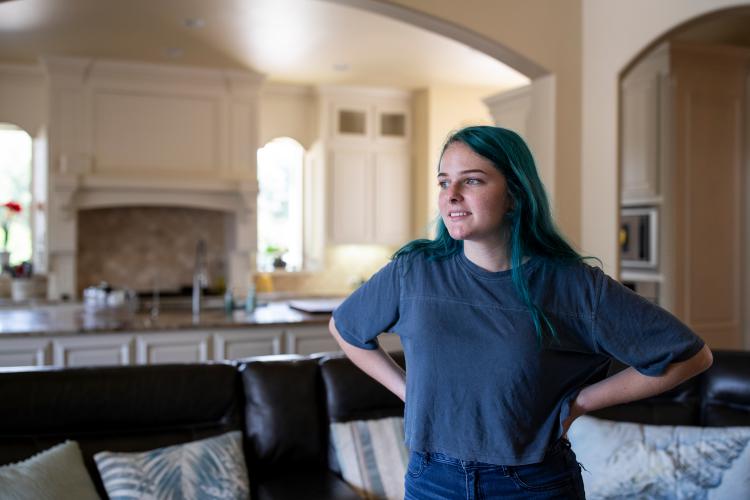
One minute Krista Charley, 19, was enjoying her last summer before leaving for college, hiking and rock climbing with friends.
The next, she was barely hanging on to consciousness, suffering a fractured hip, broken bones in her face and injuries to her internal organs during a 20-foot fall from the face of a cliff at Mineral Wells State Park.
Krista’s friends called for help and she was rushed to JPS Health Network on a journey that included a boat, an ambulance and, finally, a helicopter. Her family met the teenager in the Emergency Department. But when she was stabilized and taken to the fifth floor of the Patient Pavilion where surgery and trauma patients receive progressive care, her parents couldn’t follow. She was on her own.
“It was tough watching them take her away,” Krista’s mother, Kim Wenger, said. “I don’t think I slept at all the first couple of days.”
When I saw her, I told my supervisor that I was staying because I couldn't just go home and leave her like that.
The young woman who’d never before been away from home for an extended time was isolated from her family by COVID-19 restrictions which currently prevent family and friends from being able to visit patients in person. She felt scared and alone, intimidated by the tough decisions she had to make daily. But the nurses who work on the fifth floor of the Patient Pavilion quickly soothed Krista’s fears and let the teen know they were going to make sure everything ended up alright.
“I remember when she came in from the Emergency Department that I was just ending my 12-hour shift,” RN Chelsea Randall said. “When I saw her, I told my supervisor that I was staying because I couldn’t just go home and leave her like that.”
Nichols spent the next few hours carefully picking gravel from Krista’s hair, then washing it and braiding it. She also gingerly washed dried blood from the teenager’s face.
Krista doesn’t remember any of that. But it’s something her mother, Kim Wenger, said she’d never forget.
“I probably called six or seven times a day to check on my daughter, and they always made time for me,” Wenger said of the nurses. “That meant everything to me, to know that the nurses were treating Krista like she was their sister or their daughter took a huge weight off.”
RN Marti Chaney said keeping patients connected with their loved ones is part of the new normal in the COVID-19 world.
“We’re their eyes and their ears,” Chaney said. “They call and ask us to update them on what’s going on. I would hope someone would do the same for me if it were my daughter in the hospital.”
Krista said it took her two or three days after she got to JPS to figure out where she was and what happened to her. She had no recollection of her fall, her ride to the hospital or anything that happened since then. When the fog started to clear and she gained some clarity, she was immediately confronted with tough decisions she’d never imagined before.
“I know I’m 19, but I still feel like a kid,” Krista said. “It was tough at first. I’d ask the nurses if I was going to be OK and they’d reassure me. They really helped me to get over my fear.”
Nichols said Krista had terrible pain in her abdomen, and nurses were concerned her injuries were more severe than broken bones and abrasions.
“She never complained about her leg, which is a pretty painful injury, so we knew she had a pretty high pain tolerance,” Nichols said. “But she was in a lot of discomfort in her abdomen and, call it nurse’s intuition, we knew there was something else going on in there.”
Doctors discovered that Krista had a lacerated pancreas, an injury that could have serious risks if not treated. It was one of three times doctors came to her bedside to tell the teen she needed to consider having a vital operation.
“We tried to be there when doctors talked to her about those things because it can be intimidating,” RN Ashley Nichols said. “We try to interpret and help the patient understand what’s going on, to advocate for them, so they know someone is on their side.”
As Krista’s wounds healed, Nichols said her physical health became less of a concern and her mental health was the priority. She was lonely and frustrated because she just wanted to go home. So nurses arranged a distant meeting where Krista stood in the fifth-floor window and waved at her family below as they brought her a care package.
“It seems like a little thing, but it meant a lot to a teenager who was missing her family,” Nichols said.
Nichols said she’s seen a lot of emotional moments in her time at JPS, but she found herself fighting back tears when she saw Krista’s eyes light up seeing her family’s faces for the first time in a couple of weeks.
Wenger works with Vizient, Inc., a company that supports health care institutions by optimizing their performance in clinical, financial, and operational management. So, she’s familiar with the hospitals of the Dallas-Fort Worth region.
“No one wants to hear their child is being airlifted to a trauma center,” Wenger said. “But I knew she was going to be in good hands at JPS. I deal with hospitals every day, and I’m just so impressed with how well my daughter was taken care of here. I’ll always be grateful to the doctors and nurses at JPS.”
